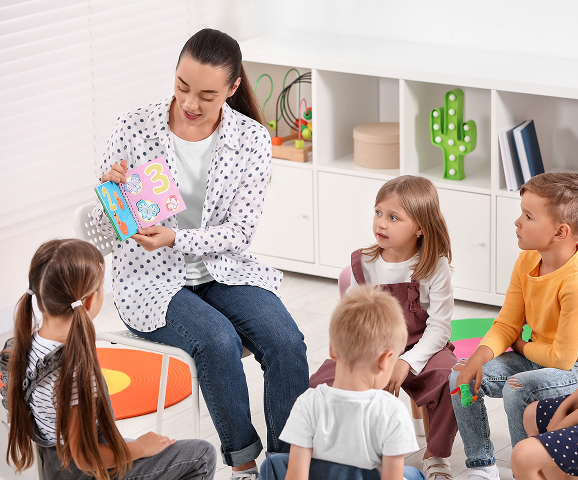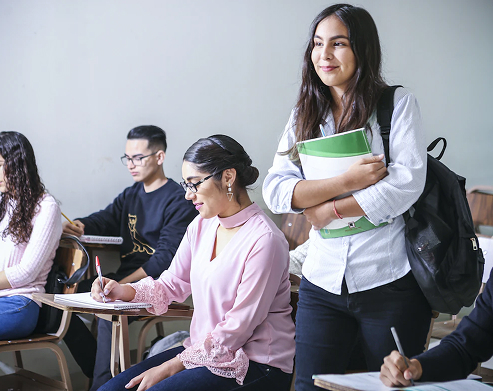Bachelor of Early Childhood Education
The Bachelor of Early Childhood Education is a forward-looking program that prepares graduates for employment in the pre-primary, early childhood education sector including kindergartens, preschools and early learning centres.
Intake Dates
23 June 2025
Fees
Location
Melbourne & Adelaide
Contact
info@scei-he.edu.au | +61 3 9602 4110
CRICOS Code
102401A
AQF Level
7

Key Info
The Bachelor of Early Childhood Education is a forward-looking program that prepares graduates for employment in the pre-primary, early childhood education sector including kindergartens, preschools and early learning centres.
Approved by the Australian Children’s Education and Care Authority (ACECQA) students study early childhood cognitive, social and physical development along with education theory and curriculum development in historical context. Classroom management techniques as well as skills in teaching literacy and numeracy are taught in line with national and state early learning frameworks (EYLF and VEYLDF).
Industry placement units are embedded into the course providing consistent opportunities for students to implement and develop their practical skills.
192 Credit Points
Full Time
4 years
Face to face
32 Subjects
4 per semester
Placement Compulsory
Embedded throughout the course
Pathways
Students interested in progressing further in this area, may choose to study one of the following areas on completion of the Bachelor of Early Childhood Education :
- Graduate Diploma
- Masters
- Doctorate
Employment Opportunities
Graduates of the 102401A Bachelor of Early Childhood Education may find employment with government, private enterprises and not-for-profit organizations.
Graduate employment opportunities include :
- Early learning and childcare centres
- Kindergarten teaching (private or public)
- Pre-school teaching
The Literacy and Numeracy Test (LANTITE)
The Literacy and Numeracy Test for Initial Teacher Education Students (the test) is designed to assess initial teacher education students’ personal literacy and numeracy skills to ensure teachers are well equipped to meet the demands of teaching.
All students enrolled in an initial teacher education course (either undergraduate or postgraduate) must sit and meet the test standard prior to graduation. All students must achieve a successful test in order to register or to be employed as a teacher.
The test has been introduced to assess those aspects of initial teacher education students’ personal literacy and numeracy skills that can be measured through an online assessment tool.
SCEI-HE will support and assist students/teacher candidates to prepare for the LANTITE.
Course Learning Outcomes
Graduates of this degree will:
Engage and collaborate ethically with children, families/carers and colleagues using a range of oral and written communication techniques.
Critically analyse theories, technologies and research relevant to early childhood education.
Evaluate curriculum, policies and quality frameworks within the Australian context for inclusion in their professional practice.
Create and maintain supportive, safe and engaging learning environments.
Critically reflect on their professional practice when making pedagogical decisions and problem solving in diverse educational context.
Exhibit broad and coherent knowledge of the diversity of Australian society and the influence of culture and family on the education of young children.
Critically reflect on their professional practice to include families/carers as capable contributors to learning and teaching processes.
Design evidence based, inclusive teaching and learning practices across a range of areas and contexts for young children from diverse backgrounds.
Exhibit broad and coherent knowledge of curriculum and assessment in the design of developmentally appropriate learning experiences.
Year 1Bachelor of Early Childhood Education
Semester 1
All subjects are 6 Credit points
ECE101 Child Development 1 (Introduction to theory: Birth to five years)
You will study diverse child development theories including sociocultural, historical, critical and post-structural approaches and these approaches to your developing professional practice. You will examine theories and approaches to understanding educational and social influences on children’s development.
The period from birth to five years and associated perspectives on the growth, learning, development and wellbeing of the child will be examined. You will examine diverse attitudes, values and beliefs about childhood and the care of children, the nature of contemporary families and the changing roles of children in a contemporary consumer society.
Assessment : Learning Journal, Essay, Report
ECE102 Language and Literacy
You will examine the importance of communication in regard to interactions with children, families and the wider community and as part of their everyday practice.This subject will refresh your understanding of literacy and the importance of providing literacy rich environments as part of the curricula for their students such as emphasised in ‘Children are Effective Communicators’ under the VEYLDF and the importance of maintaining a first language to children’s identity, wellbeing, communication and learning.
This subject will also determine your individual written and spoken literacy levels and capabilities through participation in the Literacy and Numeracy Test for Initial Teacher Education .
Assessment : Learning Design, Essay, Aural Analysis, and LANTITE preparation
ECE103 Maths and Numeracy
You will study theories and approaches in teaching numeracy to young children from birth to five years. They examine strategies for developing numeracy rich play-based learning environments incorporating a range of understandings, materials, concepts and skills.You will learn the current national framework and standards and policy to effectively develop the preservice teachers with the necessary knowledge and competencies to teach mathematics and numeracy to young children from diverse backgrounds.
Assessment : Essay, Lesson Planning, Oral Presentation, , and LANTITE (Numeracy) preparation
ECE104 Child Health, Wellbeing and Nutrition
In this unit you will examine strategies for promoting and maintaining health, wellbeing and nutrition in young children (0-5 years). You examine the regulatory and legislative requirements related to sleep and rest, immunisation, incidents, injuries, infectious diseases and responding and caring for sick children. Requirements include those stated in the ACECQA, NQF, EYLF, the VEYLDF and the Victorian Curriculum standards.
This unit will also examine pedagogical practices in relation to the overall health, wellbeing and nutrition of infants and young children in an early childhood education context. The unit discusses hygiene practices, and the management of sick children including those with infectious diseases. It also examines concepts of wellbeing, including the recognition of feelings, regulating emotions, the sense of self, and being in the moment (mindfulness).
Assessment : Quiz, Program Design, Essay
Semester 2
All subjects are 6 Credit points
ECE105 Early Childhood Curriculum: Theory and Pedagogy
You will examine early learning pedagogy and curriculum in detail. You will also examine critical theories relevant to the early learning educator. You also examine the importance of establishing respectful and caring relationships with diverse children, families and communities in order to work collaboratively to construct appropriate curriculum and learning experiences.
Assessment : Report, Essay, Learning Design
ECE106 Play Based Learning
This subject examines research-informed play-based teaching and learning approaches essential to stimulate and integrate a wide range of children’s intellectual, physical, social and creative potential. It also examines the role of the educator in observing, planning, implementing and reflecting on programs for children in a play based environment.
Assessment : Analysis, Philosophy statement, Practical Play Based Model and Action Plan
ECE107 Teacher Parent and Community
You will examine relevant theories such as Bronfenbrenner’s ecological systems theory that examines the interrelationships between the child and their family, community and culture and the early learning implications.
Assessment : Essay x2, Learning design and resource toolkit
ECE108 Professional Practice 1: Observation and Documentation
This professional practice subject provides you with the exposure to organisational regulatory requirements, policies and processes as outlined in the VEYLDF & V.I.T. Graduate Teacher Standards.
During the placement, you will undertake work duties and responsibilities as a ‘pre-service’ early childhood educator under the guidance of the host organisation supervisor. Attendance will be recorded and approved by the facility’s appointed Placement Supervisor (Educator) and performance assessed against the learning outcomes and the Victorian Early Years Learning and Development Framework (VEYLDF).
Assessments : Reflective Essay/Practice Journal, Essay, Professional Experience Appraisal
Year 2Bachelor of Early Childhood Education
Semester 1
All subjects are 6 Credit points
ECE201Child Development 2 (Theory : Birth to Three years)
This subject will build on knowledge and understanding gained in Child Development 1. Students examine the development of children (birth to two years) in greater detail, and focus on the importance of relationships, interactions and attachment. You will develop your understanding of the theoretical perspectives and practical approaches for understanding the complexity of influences on children’s development within educational and social contexts.
You will explore a range of strategies that support children’s learning with particular focus on the importance of scaffolding and valuing children’s strengths and differences.
This unit will explore strategies to guide children’s behaviours and support teachers to plan environments that promote social competence.
As part of this unit of work, you will be immersed in cultural inclusiveness, ethical responsibility and the welfare of the child.Assessments : Online quizzes x4, Essay and Teaching Philosophy StatementPre-requisite : ECE101 Child Development 1
ECE202 Language and Literacy
This subject investigates the language and literacy development of children from birth to five years. Students examine a range of theories and curricula including cognitive development theories, Lev Vygotsky’s sociocultural theories, Bronfenbrenner’s ecological theory and the New Zealand early childhood curriculum Te Whariki. Students examine how children become effective communicators and explore the rich range of available literacy education programs.Additionally, the intricacies of learning English as a second language within a culturally diverse community and class environment is addressed. You will familiarise yourself with concepts of the literacies of technology, pop culture, functional literacy, ecological literacy and literacies other than English.
Assessment : Newsletter, Essay, Portfolio – Literacy Program Plan
Pre-requisite : ECE101 Child Development 1
ECE203Maths and Numeracy in Early Childhood (Birth to Five Years)
This subject focuses on numeracy in early childhood development and strategies for introducing children to concepts of mathematics.
Assessment : Project Based Approach Learning Activity, Essay
Pre-requisite : ECE103 Maths and Numeracy
Co-requisite : ECE204 Professional Practice 2
ECE204Professional Practice 2 Linking Theory to Practice (Birth to Three Years)
This is the second in a sequence of six Professional Practice field placement subjects designed to give the student practical experience across all age groupings covered by the course. Field placements allow students to put theory into practice and provide exposure to organisational regulatory requirements, policies and processes and professional practice frameworks (EYLF, VEYLDF & V.I.T. Graduate Teacher Standards), intervention and outcomes.
During placement, students undertake work duties and responsibilities as a ‘pre-service’ early childhood educator under the guidance of the host organisation supervisor. Attendance will be recorded and approved by the facilities appointed Placement Supervisor (Educator) and performance assessed against the learning outcomes and the Early Years Learning Framework (EYLF) and the Victorian Early Years Learning and Development Framework (VEYLDF).
The subject will consist of :
- Pre-placement workshops that prepare students for professional practice and setting up ongoing support and assistance opportunities
- Professional practice of 70 hours: 5 days per week for 2 weeks in a SCEI-HE approved host
- Visits by a SCEI-HE Professional Experience Officer and the Subject Coordinator during the Placement for the purpose of counsel and assessment.Assessment : Reflective Essay, Professional Experience Portfolio , Professional Experience Appraisal
- Pre-requisite : ECE101 Child Development, ECE104 Child Health, Wellbeing and Nutrition and ECE108 Professional Practice 1Co-requisite : ECE203 Maths and Numeracy in Early Childhood 2
Semester 2
All subjects are 6 Credit points
ECE205Media, Technology and Prevalent Culture V1 (Birth to Five Years)
This unit critically examines the use of technology in the early learning classroom. It will examine the use of I-Pads, programming robotics kits to enhance understanding of mathematics, science and engineering and game-based learning.
Assessment : Report, Design Learning, Essay, Gamification Learning Experience
Pre/Co-requisite : ECE304 Professional Practice 4
ECE206Science and Environmental Education in Early Childhood (Three to Five years)
Science and Environmental Education in Early Childhood examines strategies for engaging the inquisitive nature of children in the sciences/environmental sciences. It details science curricula and assessment strategies as well as contemporary concepts and discoveries.
Assessment : Essay, Teaching Resource Portfolio
ECE207Creative and Performance Arts 1 Music and Performing Arts (Birth to Five Years)
This subject examines the use of the performing arts to nurture and enhance children’s cognitive growth and overall development. It examines relevant theories such as those put forward by Piaget, Vygotsky, Koster and Mayesky. It investigates open ended activities to explore divergent thinking to support creative processes rather than outcomes and that develops children’s aesthetic, sensory, perceptual and expressive development. It examines pedagogical concepts relevant to music and the performing arts. You will examine strategies to inclusive music and performing arts experiences, for children aged birth to five.
Assessment : Essay, Evaluation Report and Design Learning
Pre/Co-requisite : ECE208 Professional Practice 3
ECE208Professional Practice 3 Observation and Documentation (Three to Five Years)
This is the third in a sequence of six Professional Practice field placement subjects designed to give the student practical experience across all age groupings covered by the course. Field placements allow students to put theory into practice and provide exposure to organisational regulatory requirements, policies and processes and professional practice frameworks (VEYLDF & V.I.T. Graduate Teacher Standards), intervention and outcomes.
The focus of this professional placement unit will be on children aged three to five years. Students practice employing effective classroom and behaviour management, implement learning experiences and foster cognitive development in children of variable capacities and cultural origins within the designated age group. In this unit the role of technology will also be explored.
During the placement, students undertake work duties and responsibilities as a ‘pre-service’ early childhood educator under the guidance of the host organisation supervisor. Student attendance will be recorded and approved by the facilities appointed Placement Supervisor (Educator) and performance assessed against the learning outcomes, the Early Years Learning Framework (EYLF) and the Victorian Early Years Learning and Development Framework (VEYLDF).
The subject will consist of :
- Pre-placement workshops that prepare students for professional practice and setting up ongoing support and assistance opportunities
- Professional practice of 70 hours: 5 days per week for 2 weeks in a SCEI-HE approved host
- Visits by a SCEI-HE Professional Placement Coordinator and the Subject Coordinator during the Placement for the purpose of counsel and assessment.Assessments : Reflective Essay, Professional Experience Portfolio, Teaching Resource Folio and Professional Experience AppraisalPre/Co-requisite : ECE207 Creative and Performance Arts 1 and ECE108 Professional Practice 2
Year 3Bachelor of Early Childhood Education
Semester 1
All subjects are 6 Credit points
ECE301Child Development 3 (Theory: Three to Five Years)
This subject will examine the development of children from three-five years of age. It will focus on the identification of important stages of early brain development, according to early childhood development theories. You will study key developmental milestones to identify the special developmental needs of children who require early intervention support.You will study the processes and procedures for referring children to healthcare professionals for possible identification of developmental delay. This unit also examines child advocacy and the educator’s role when acting on behalf of children and their families.This subject further explores the culturally inclusive learning programs including Aboriginal and Torres Strait islander ways of knowing and being.
Assessments : Quizzes x2, Learning Design and Essay
ECE302Diversity and Inclusivity in Early Childhood
You will explore post-colonial and multicultural approaches to learning design. Issues related to gender, disability and the use of language in the class will also be examined in the context of relevant pedagogies, ICT policies, frameworks and models for teaching.
Assessments : Essays x2 Learning Design
ECE303Curriculum - Planning & Early Childhood Learning Spaces
You will study methodologies for collecting and evaluating data to contribute to the planning and implementing of a child-centred curriculum. Diagnostic assessment, assessing what children know, their interest, skills and strengths, is discussed as a tool for making decisions to assist individual children. You will study techniques for ‘noticing’ (deep listening), ‘recognising’ (deliberately extracting meaning) and ‘responding’ (intentionally progressing children’s learning).You will also study methods for generating a diversity of learning environments that are welcoming and enriching to the lives and identities of children- vibrant environments that can support children’s interests and needs.
They include both indoor and outdoor learning environments.
The unit also includes an examination of relevant content for curriculum development.
Assessments : Case Study, Report, and Design Learning
ECE304Professional Practice 4 : Linking Theory to Practice (Three to Five Years)
This is the fourth in a sequence of six planned Professional Practice field placement subjects designed to give the student practical experience across all age groupings covered by the course. Students to put theory into practice and gain exposure to organisational regulatory requirements, policies and processes and professional practice frameworks (EYLF, VEYLDF & V.I.T. Graduate Teacher Standards), intervention and outcomes.
The focus of this professional placement unit will be on children aged three to five. You will further develop your ability to employ effective classroom and behaviour management, plan and implement learning experiences and foster cognitive development in children of variable capacities and cultural origins within the designated age group. The learning experiences demonstrated in this professional practice unit will focus on children’s interest, skills and behaviour. You will be expected to include appropriate ICT as studied in ECE205 Media Technology and prevalent Culture when designing learning experiences for students.
During the placement, you will undertake work duties and responsibilities as a ‘pre-service’ Early Childhood Educator under the guidance of the host organisation supervisor. Attendance will be recorded and approved by the facilities appointed Placement Supervisor (Educator) and performance assessed against the learning outcomes, the Early Years Learning Framework (EYLF) and the Victorian Early Years Learning and Development Framework (VEYLDF).
The unit will consist of :
- Pre-placement workshops that prepare the student for professional
- Professional practice of 5 days per week for 3 weeks (total of 105 hours) in a SCEI-HE approved host organisation.
- Visits by a SCEI-HE Professional Placement Coordinator and the Subject Coordinator during the Placement for the purpose of counsel and assessment.Assessment : Reflective Essay, Professional Experience Portfolio, and Professional Experience Appraisal
- Pre-requisite : ECE108, ECE204, ECE304Co-requisite : ECE205 Media Technology and Prevalent Culture
Semester 2
All subjects are 6 Credit points
ECE305Comparative Early Childhood Education Systems
The unit will examine diverse international childhood education systems. Students study political, religious and cultural ideologies, government policy, economic pressures, traditions and gender roles in global contexts. Students also consider the potential impact of the values, philosophies and practices of the education system of a child’s country of origin and social cultural background.
Assessment : Oral presentation, Design Learning Experiences, and Ess
ECE306Health and Physical Education (Birth to Five Years)
This subject examines the role of physical activity in early childhood learning and social development. It examines the potential impact of physical activity on cognitive functioning, memory, concentration, behaviour and academic achievement for children. It references national and state learning frameworks, and relevant theories and pedagogical practices relevant to children in an early childhood setting. You will also consider the links between physical activity, nutrition and general outcomes.You will examine strategies for integrating inclusive physical activity into your professional practice.
Assessment : Critical Reflection, Essay and Design Learning Environment
ECE307Creative and Performance Arts 2 (Three to Five Years) (Visual Media)
This subject examines the use of the creative arts to nurture and enhance children’s cognitive growth and overall development. It examines relevant theories such as those put forward by Piaget, Vygotsky, Koster and Mayesky. It investigates open ended activities to explore divergent thinking to support creative processes rather than outcomes, and that develops children’s aesthetic, sensory, perceptual and expressive development.
Assessment : Essay, Learning Design (Visual and Digital Media) and Evaluation
Pre-requisite : ECE207 Creative and Performance Arts 1 (Music and Performing Arts)
Co-requisite : ECE308 Professional Practice 5
ECE308Professional Practice 5 : Linking Theory to Practice (Three to Five years)
This is the fifth in a sequence of six planned Professional Practice field placement subjects designed to give the student practical experience across all age groupings covered by the course. Field placements allow you to put theory into practice and provides exposure to organisational regulatory requirements, policies and processes and professional practice frameworks (VEYLDF & V.I.T. Graduate Teacher Standards), intervention and outcomes.
During the placement, you will undertake work duties and responsibilities as a ‘pre-service’ early childhood Educator under the guidance of the host organisation supervisor. Attendance will be recorded and approved by the facilities appointed Placement Supervisor (Educator) and performance assessed against the learning outcomes, the Early Years Learning Framework (EYLF) and the Victorian Early Years Learning and Development Framework (VEYLDF).
Content :
- Pre-placement workshops that prepare the student for professional
- Professional practice of 5 days per week for 3 weeks (total of 105 hours) in a SCEI-HE approved host organisation.
- Visits by a SCEI-HE Professional Placement Coordinator and the Subject Coordinator during the Placement for the purpose of counsel and assessment.
- Assessment : Design Learning Experiences, Evaluation, and Professional Experience AppraisalPre-requisite : ECE301 Media Technology and Prevalent Culture; ECE302 Diversity and Inclusivity in Early Childhood; ECE303 Curriculum Planning and Early Childhood Learning Spaces and Professional Practice 1, 2, 3 and 4.Co-requisite : ECE307 Creative and Performance Arts 2.
Year 4Bachelor of Early Childhood Education
Semester 1
All subjects are 6 Credit points
ECE401Critical Issues of Child Safety and Protection (Birth to Five years)
This unit of study will examine key legislation, frameworks and practices related to child safety and protection. Particular attention will be given to identifying responding to risk and serious harm to children.
Assessment : Case Study Analysis, Essay and Support Strategy Action Plan
ECE402Social Perspectives of Childhood through History
This subject examines the history of the perception of the child and associated childcare practices from Medieval times to today. This subject challenges you to investigate the concept of ‘childhood’ itself and the theorists whose philosophies and education models were influenced by social, political, religious and psychological movements. It encompasses the rise of the kindergarten and pre-school early childhood education in Australia.
Assessment : Written Test, Poster, and Essay
ECE403Management and Professional Practice in Early Childhood Education
This subject examines contemporary global diverse leadership practices in early childhood settings, including present-oriented and future-oriented leadership.It traces journeys into leadership and the support mechanisms needed at different points in the career trajectory. You will examine the work life of a variety of leaders in a range of early childhood settings to identify potential career pathways. It examines the role of mentors, learning communities and reflective practices as agent of transformation and change.
Assessment : Essay, Analytical Report and Collaboration/Action Plan
ECE404The Educator as Researcher
You will study research theories and methodologies relevant to early childhood. They include practice based, qualitative and quantitative research practices. Research as a mechanism for social justice and social change as well as research ethics are also examined.
Assessment : Literature Review, Research Methodologies Report, and Research Proposal
Semester 2
All subjects are 6 Credit points
ECE405Society and the Child
This subject explores a range of socio-cultural and socio-behavioural theories related to child development to gain an understanding of how these impact on a child’s culture, values, their personal identity and sense of place in the community and society.
Assessment : Essay x2 and Reflective Essay
ECE406Advanced Assessment and Evaluation Strategies
This subject highlights the role of assessment in providing educators, parents and families with
critical information about a child’s development and growth. This unit focuses on assessment and evaluation theory to facilitate development and support transitions.
Assessment : Assessment Report and Learning Plan, Role Play /Transition learning and development strategy and Essay
ECE407Creative and Performance Arts 3 (Movement - Three to Five Years)
This subject examines the benefits of dance and movement in early childhood settings. It explores the ways it facilitates emotional connections with the self, others and the environment.
You will investigate the pedagogies and child development theories specific to the acquisition of coordinated motor skills and use this knowledge to design learning experiences that encourage and enhance the development of these skills in young children.Learning experiences will include a variety of global dance and movement practices. The role of consultation with families in creating successful inclusive learning experiences is also considered. You will identify and implement appropriate inclusion strategies to support children with diverse physical and learning abilities.
Assessment : Essay, Design and Assess Learning and Reflective Essay
Pre-requisite : ECE307 Creative and Performance Arts 2.
Co-requisite : Professional Placement 6
ECE408Professional Practice 6 (Full supervision of class : Birth to Five years)
This is the sixth and final in a sequence of six planned Professional Practice field placement subjects designed to give the student practical experience across all age groupings covered by the course.Field placements allow you to put theory into practice and provides exposure to organisational regulatory requirements, policies and processes and professional practice frameworks (EYLF, VEYLDF & V.I.T. Graduate Teacher Standards), intervention and outcomes.
You will design and implement learning experiences for children aged between three to five over a four-week period.
The design will be pre-approved by the Supervising Mentor and be in line with the state curriculum, EYLF and VEYLDF.
During the placement, you undertake work duties and responsibilities as a ‘pre-service’ early childhood educator under the guidance of the host organisation supervisor. Attendance will be recorded and approved by the facilities appointed Placement Supervisor (Educator) and performance assessed against the learning outcomes, The Early Years Learning Framework (EYLF) and the Victorian Early Years Learning and Development Framework (VEYLDF).
Content :
- Pre-placement workshops that prepare the student for professional
- Professional practice of 5 days per week for 4 weeks (total of 105 hours) in a SCEI-HE approved host organisation.
- Visits by a SCEI-HE Professional Placement Coordinator and the Subject Coordinator during the Placement for the purpose of counsel and assessment.
- Pre-requisite : ECE403 Management and Professional Practice in Early Childhood Education, ECE401 Critical Issues of Child Safety and Protection, ECE406 Advanced Assessment and Evaluation Strategies and Professional Practice subjects 1, 2, 3, 4 and 5
- Co-requisite : ECE307Creative and Performance Arts 3
School Leaver
English Language Requirements
Successful Completion Of Victorian Certificate Of Education (VCE) Units 3 And 4 With A Study Score Of At Least 25 In English, Or At Least 30 In English As An Additional Language (EAL)
Entry Requirements
Successful Completion Of The VCE With An ATAR Of 65, Or Its Equivalent Interstate / International Year 12 Qualification


Mature Aged
English Language Requirements
Completion Of The Special Tertiary Admissions Test Written English
Entry Requirements
- Satisfactory Completion Of The Special Tertiary Admissions Test
- Completion Of An Australian Diploma Or Higher
- Partial Completion Of An Australian Degree
- Evidence Of Relevant Employment Experience And Written Statement
International Students
English Language Requirements
One of the following:
- An Australian Diploma
- 6.5 In IELTS (With No Band Less Than 6.0)
- Any Other Equivalent Assessment Of English Language Proficiency (E.G. TOEFL, PTE)
- Completion Of An Approved English Foundation Course
Entry Requirements
Year 12 Certificate Or Equivalent International Qualification.


Professional Practice
The aim of industry placement program is to prepare you for the world of work and assist in applying your newly acquired skills and knowledge in real lifework environments.
It also allows you to make meaningful connections with potential employers that may be able to employ you upon completion of your degree, or act as a work reference for other employment opportunities.
Professional Practice
The placement handbook is an essential resource for students, identifying what to expect and how to conduct themselves whilst on placement.
Placement Contracts
For external placement organisations wishing to facilitate SCEI-HE students for placement, please download, populate and return our placement contract.
Placement Requirements
A document specifically outlining the student’s preparation requirements prior to attending placement is downloadable below.